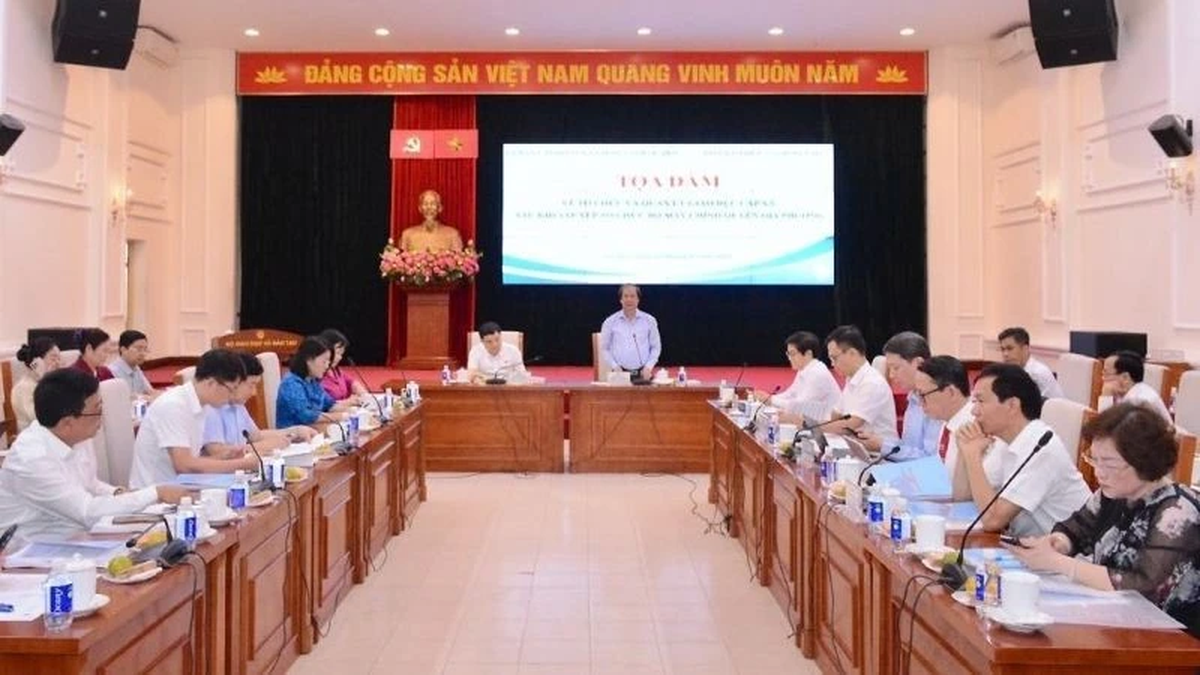
Perspectives on protecting vulnerable consumers
Vulnerable consumers compared to ordinary consumers have their own characteristics in terms of health, psychology, lower political -social or economic status ( 1 ) ... These characteristics put them at risk of being overlooked, having their rights violated and suffering many negative impacts, leading to social and psychological instability. Therefore, most countries and international organizations agree that a higher level of protection is needed for vulnerable consumers. However, there is still no consensus on how to define vulnerable consumers ( 2 ) .
The United Nations uses the term “vulnerable and disadvantaged consumer” in its 2015 Guidelines on Consumer Protection, to indicate the need to protect the rights of vulnerable and disadvantaged consumers, but has not yet provided a specific definition ( 3 ) . According to the 2014 recommendation of the Organization for Economic Cooperation and Development (OECD), all consumers may experience vulnerability at some point in time, the vulnerability may arise from the consumer's psychological or financial state or from the nature of the transaction.
In Vietnam, Clause 1, Article 8 of the Law on Consumer Protection (2023) defines: “A vulnerable consumer is a consumer who is likely to suffer many adverse impacts on access to information, health, property, dispute resolution at the time of purchasing or using products, goods, services…” Accordingly, in essence, vulnerable consumers have weaker characteristics and circumstances than other ordinary consumers, although not to the extent of affecting the consumer’s civil capacity and the legality of civil transactions, but in reality can make them victims of unfair transactions.
On January 22, 2019, the Central Party Secretariat issued Directive No. 30-CT/TW, “On strengthening the Party's leadership and the State's management responsibility for protecting consumers' rights”. One of the tasks and solutions stated in the Directive is: “Improving knowledge and consumer skills for the whole society and creating favorable conditions for effectively implementing consumer rights, especially for vulnerable consumers (children, students, the elderly, women, poor workers, rural areas, mountainous areas, border areas, islands, remote areas, etc.)”. On May 26, 2020, the Government issued Resolution No. 82/NQ-CP, on the Government 's action program to implement Directive No. 30-CT/TW, along with many solutions aiming to build a safe and sustainable consumption environment, contributing to protecting the rights of vulnerable consumers.
Vietnam has made significant progress in building and perfecting the legal system to protect the rights of consumers in general and vulnerable consumers in particular. Documents such as the Law on Natural Disaster Prevention and Control 2013, the Law on the Elderly 2019, the Law on Children 2016, the Law on Persons with Disabilities 2010, the Law on Consumer Protection 2023, etc. have specific provisions, contributing to promoting the protection of the rights of vulnerable consumers. Article 8 of the Law on Consumer Protection 2023 also clearly states 7 groups of consumers identified as "vulnerable", including: The elderly; people with disabilities; children; ethnic minorities, people living in ethnic minority areas and mountainous areas, islands, areas with difficult or especially difficult socio-economic conditions; pregnant women or women raising children under 36 months old; people with serious illnesses; members of poor households. The regulation helps consumers identify themselves as vulnerable consumers. Business organizations and individuals rely on it to develop appropriate policies for each consumer group.
According to the General Statistics Office, Vietnam currently has about 11.4 million elderly people, accounting for about 11.86% of the population ( 4 ) . The country has about 7 million people with disabilities, accounting for more than 7.06% of the population aged 2 and over, of which people with severe and extremely severe disabilities account for about 28.9%, about 10% of people with disabilities are from poor households. The rate of dependent children aged 5-17 in Vietnam is also a very large number, with about 21 million children, accounting for about 20.6% of the total population. Also according to the Press Release of the Preliminary Results of the 2019 Population and Housing Census, by the Central Steering Committee for the Population and Housing Census, the country has 14,123,255 people of other ethnic groups, accounting for 14.7% of the total population. As of the results of the review of poor and near-poor households in 2024, the national average is 4.06%, the total number of multidimensional poor and near-poor households is 1,258,997 households. Of which, 599,608 poor households account for 1.93%; 659,389 near-poor households account for 2.13% ( 5 ) . The above figures partly show that the proportion of vulnerable consumers is not small compared to ordinary consumers. Therefore, it is extremely necessary to clearly define this group of subjects in order to build a suitable legal mechanism to protect and guide them in consumer transactions.
Consulting, resolving consumer complaints and suggestions have also been paid attention to and effectively implemented in recent times. According to a report by the National Competition Commission (Ministry of Industry and Trade), the Consumer Consulting and Support Hotline (1800.6838) received a total of 8,446 calls in 2024. Of these, 5,536 calls were received and answered (about 78.7%); about 65.5% of the answered calls were related to consumer rights protection issues. At the same time, the Commission also received 787 petitions, letters of feedback, requests and complaints from consumers ( 6 ) .
Many agencies and business organizations show their concern for vulnerable consumers by establishing priorities, such as: Air passenger transportation services give priority to check-in procedures, have separate aisles for vulnerable consumer groups (war invalids, disabled people, pregnant women, children under 2 years old, etc.); some organizations and individuals provide services to design rest rooms and breastfeeding rooms specifically for women with children under 36 months old, or send experienced people to contact and support equipment for people with disabilities ( 7 ) ...
Clause 2, Article 1, Decision No. 1157/QD-TTg, dated July 12, 2021, of the Prime Minister, "Approving the Program for developing consumer rights protection activities for the period 2021 - 2025" clearly states: "ensure that every year at least 200,000 consumers nationwide participate in propaganda activities, disseminate policies and laws on consumer rights protection or receive training in consumption skills, including priority programs for vulnerable consumers such as students, children, the elderly, consumers in rural areas, remote areas, border areas, islands...".
The attention of state agencies, organizations, business individuals and the whole society towards vulnerable consumer groups has partly helped them limit their psychological and physical complexes, and participate in consumer transactions with more guaranteed rights.
Some limitations and shortcomings in legal regulations on protecting the rights of vulnerable consumers
In the current legal system of Vietnam, the protection of vulnerable consumer rights still has some shortcomings:
The first, Vulnerable consumers have difficulty identifying themselves as belonging to this group. The law stipulates that in transactions, customers must provide documents and evidence to prove that they are vulnerable consumers. However, what specific documents and evidence include is not clearly defined, causing confusion for both consumers and business organizations and individuals. In addition, the concept of vulnerable consumers in the Law on Consumer Protection 2023 only identifies and classifies based on the general characteristics of the group of people, and does not generalize cases of weakness and vulnerability caused by specific situations or psychological states.
Monday, The current legal system still lacks specific and clear regulations to protect vulnerable consumer groups. Regulations on the responsibilities of business organizations and individuals are still general, lacking specific standards on product and service quality, regulations on information provision and complaint settlement mechanisms. In fact, in recent times, there have been many cases of infringement of the rights of vulnerable consumers , causing public outrage, such as: Children in schools suffering from food poisoning due to lack of food safety and hygiene; the elderly being discriminated against when using bus services; people with disabilities being denied air transport services; online lending services targeting low-income people, but the information is unclear and lacks transparency... ( 8 ) . Or the situation of false advertising of drugs and functional foods, causing confusion, affecting the health of consumers, especially vulnerable consumer groups (9) .
Tuesday, The mechanism for supporting and protecting the rights of vulnerable consumers still lacks appropriate legal and financial support channels. Vulnerable consumer groups such as the poor, people with low education levels , and people in rural areas are often unaware of their rights or do not have enough resources to access legal support services. The legal system does not have a truly effective mechanism to help these groups in lawsuits or complaints related to consumer rights. This makes them easily overlooked or not fully protected by the law. In addition, the capacity of state management agencies in inspecting, examining, and handling violations is not up to standard, and coordination is lacking. The role of social organizations in protecting the rights of vulnerable consumers has not been fully promoted.
Fourth, some contents in sustainable development policies have a direct impact on the interests of vulnerable consumers, such as encouraging the use of green, environmentally friendly products. Although these products bring many benefits, their prices are often higher than conventional products, making it difficult for low-income consumers to access them...

Completing legal regulations to protect the rights of vulnerable consumers in Vietnam today
To protect the interests of consumers in general and vulnerable consumers in the context of the current development of the digital economy and trade globalization, it is necessary to effectively implement the following solutions:
One is, In legal documents, it is necessary to specify more clearly the concept and characteristics of each group of vulnerable consumers. In addition to the characteristics mentioned in the Law on Consumer Protection 2023, it is necessary to mention more factors such as circumstances affecting the personal psychology (temporary) of consumers in some special cases. At the same time, it is necessary to expand the subjects beyond the list of 7 groups listed in this law. For example, it is possible to add more general provisions to the law, such as: "Other consumers are likely to suffer many adverse impacts on access to information, health, property, dispute resolution at the time of purchase or use of products, goods, services as prescribed by law". The addition of this provision empowers relevant agencies to identify specific cases of vulnerable consumers, thereby helping the law to quickly adapt to the constant changes of the market, ensuring that no one in need of protection is left out.
Second, Supplement specific regulations on the responsibilities of business organizations and individuals towards vulnerable consumers, especially in receiving and resolving disputes with consumers. Issue regulations on protecting vulnerable consumers in specific areas such as finance, health, education, etc. Create favorable conditions for business organizations and individuals to build and develop environmentally friendly products and services, while also being suitable for vulnerable consumers.
Third, strengthen the mechanism to support and protect vulnerable consumers through legal and financial support channels, such as: free legal advice, support for lawsuits, vulnerable consumer support funds, etc. Strengthen propaganda work so that consumers can grasp information and be ready to receive support. Encourage and provide financial support for social organizations to participate in activities to protect the rights of vulnerable consumers. Increase resources for state management agencies, improve professional capacity for officials in consumer protection work.
Four is, Establish a mechanism to closely monitor compliance with the law by business organizations and individuals. In reality, protecting the rights of vulnerable consumers does not stop at resolving complaints after their rights have been violated, but must be ensured from the very beginning, in order to prevent the risk of infringement from occurring. Preventing consequences from the beginning will help minimize arising problems. Therefore, the implementation and compliance with the Law on Consumer Protection by business organizations and individuals plays an important role. In addition, for the monitoring mechanism to be effective, there must be close coordination between state management agencies, social organizations and business organizations and individuals.
Fifth, promote communication work so that society can join hands to protect consumers in general and vulnerable consumers in particular. On the other hand, vulnerable consumers themselves should know their rights and effectively apply legal regulations. Use a variety of communication channels flexibly to ensure that all vulnerable consumers can access information. Strengthen communication to the business community, mobilize the participation of business associations in this work, thereby raising awareness of business organizations and individuals about their responsibilities and behavior towards vulnerable consumers.
In the current context, protecting the rights of vulnerable consumers is an important issue, but also facing many challenges. There is a need for synchronous and effective solutions in policy making, perfecting the legal system, establishing monitoring and management mechanisms to effectively protect the rights of vulnerable consumers, contributing to ensuring social fairness, towards the goal of sustainable national development./.
--------------------------------
(1) See: Permanent Office on Human Rights and Ho Chi Minh National Academy of Politics (coordinated implementation): Human rights, basic rights and obligations of citizens in the Constitution of Vietnam, Hanoi, 2015.
(2) See: Christine Riefa and Séverine Saintier: Vulnerable Consumer and the Law : consumer protection and access to justice, 2021.
(3) Ministry of Industry and Trade: Policy impact assessment report of the proposal to develop the Law on Consumer Rights Protection (amended), Hanoi, 2021.
(4) United Nations Population Fund: “Elderly people in Vietnam: Analysis from the 2021 Population Change and Family Planning Survey”, December 27, 2022, https://vietnam.unfpa.org/vi/publications/nguoi-cao-tuoi-viet-nam-phan-tich-tu-dieu-tra-bien-dong-dan-so-va-ke-hoach-hoa-gia-dinh
(5) See: General Statistics Office - Ministry of Finance: "Population", General Statistics Office's website, https://www.gso.gov.vn/dan-so/
(6) See: National Competition Commission: “Some proposals to improve the law on consumer rights protection”, May 22, 2024, https://www.bvntd.gov.vn/tintuc_sukien/mot-so-de-xuat-hoan-thien-phap-luat-bao-ve-quyen-loi-nguoi-tieu-dung/
(7) See: National Competition Commission: Annual Report 2023
(8) See: Nguyen Thi Thanh Mai - Ngo Khanh Tung: "Some legal issues on protecting the rights of vulnerable consumers under current Vietnamese law" , Law and Development Magazine , February 12, 2025, https://phapluatphattrien.vn/mot-so-van-de-phap-ly-ve-bao-ve-quyen-loi-nguoi-tieu-dung-de-bi-ton-thuong-theo-phap-luat-viet-nam-hien-hanh-d3511.html#google_vignette
(9) See: Reporter: "Warning about tricks to spread false information and advertise drugs on social networks", VTV Times , November 15, 2024, https://vtv.vn/cong-nghe/canh-bao-chieu-tro-phat-tan-thon g-tin-sai-lech-quang-cao-thuoc-tren-mang-xa-hoi-20241114151352645.htm
Source: https://tapchicongsan.org.vn/web/guest/nghien-cu/-/2018/1112202/hoan-thien-phap-luat-bao-ve-quyen-loi-nguoi-tieu-dung%2C-vi-muc-tieu-phat-trien-ben-vung.aspx



































































































Comment (0)